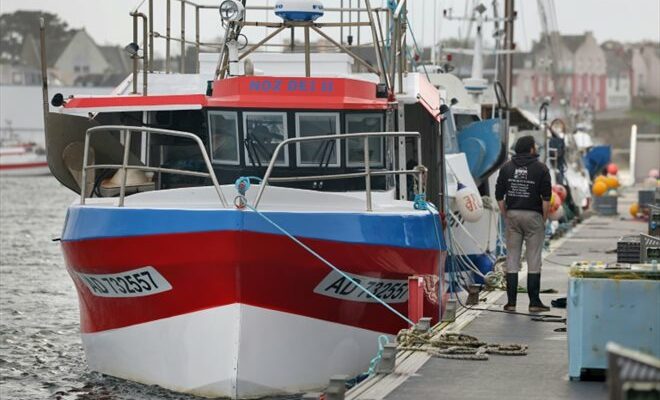For the Sables d’Olonne fishmongers, the ban on the exit of certain fishermen represents “crazy losses” (AFP/Archives/LOIC VENANCE)
In boots and aprons, the fishmongers of Les Sables d’Olonne (Vendée) close shop three hours early. This February morning, the auction received nine tonnes of fishing. Without the restrictions in the Bay of Biscay, “it would be more than 30 tonnes”, laments one of them.
For Benjamin Hennequin, head of the company of the same name, the ban on the exit of certain fishermen, from January 22 to February 20 inclusive, represents “crazy losses”.
Located in the heart of the fish market, a concrete building with the smell of the tide, its fish trading company has 23 employees, eight of whom are partially unemployed due to lack of supplies.
“It’s sole season: we normally have the biggest turnover of the year. This morning, we had 290 kg. Normally, we can have several tonnes,” explains Mr. Hennequin . “We are losing all foreign markets because it is not profitable to export too small quantities.”

A message “Go to sea, fisherman” on the beach of Sables d’Olonne, February 5, 2024 in Vendée (AFP/Archives/Sebastien SALOM-GOMIS)
If trucks do take his fish to the back of the auction, “other customers have already gone elsewhere, to the Dutch in particular, and perhaps for good”, he says.
The fishing ban concerns some 450 vessels (eight meters or more, equipped with certain nets), in order to avoid accidental captures of dolphins and porpoises, following a decision by the Council of State.
Various environmental associations have been calling on the government to act for several years.
-“The anger that comes out”-
A fisherman on the island of Yeu for 27 years, Adrien Delavaud apologizes for “speaking dryly”: “It’s anger that comes out.”
Banned from leaving, he usually employs six sailors on his boat, the “Camelys”. He is annoyed at having equipped it “for nothing” last year with an acoustic repellent.
“It’s unfair: great efforts have been made and the fishermen are still punished. If the government wants the end of French artisanal fishing, we’re off to a good start. We may not all get through this “, he sighs.
To compensate for the losses, the government announced compensation amounting to “80 to 85%” of turnover for fishermen and 75% of gross operating surplus for fishmongers.

Matthieu Claquin, boss of the Noz-Dei II, an 11-meter gillnet, at the dock in the port of Audierne, February 14, 2024 in Finistère (AFP/Fred TANNEAU)
“We hope to be paid quickly. We have salaries to pay to the guys. They have to live,” says Benoit Normant, 33, boss of L’Aurore Boréale, an 11-meter gillnet, which employs two sailors, Audierne (Finistère).
In this port on the tip of Brittany, in the far north of the Bay of Biscay, around ten netnetters are lined up along the quay in a light rain. Some fishermen are “tinkering” on board to kill time.
“If I can’t wait to leave? Ah well, yeah, I can’t hold on any longer,” confides Matthieu Claquin, 27, boss of the Noz-Dei II, an 11-meter gillnet, scanning the fishing zones on his screen .
Like others, he rants against “extremist NGOs” or the national fisheries committee which “no longer defends us”. He admits to capturing dolphins accidentally, “four or five per year”, but “either they are sick or they let themselves die”, he assures.
-“Symbolic barrier”-
Benoit Normant emphasizes the different kinds of acoustic repellents, tested on his nets, on the hull of his boat, and by the scientific observers welcomed on board. “We’re making efforts, don’t think we’re doing nothing… And no one cares,” he complains.

The Noz-Dei II fishing boat docked in the port of Audierne, February 14, 2024 in Finistère (AFP/Fred TANNEAU)
On the other side of the port, the fish market is desperately empty, racks put away, fenwicks stopped, when it usually churns out 5 to 10 tonnes of fish per day.
“It’s time for things to start again,” laments François Priol, its director, who has lost up to 80% of his usual tonnage since January 22.
“We do not realize the psychological impact” of this “unprecedented” closure of fishing, underlines Thomas Le Gall, president of the Pêche Avenir Cap Sizun association.
“We have crossed a symbolic barrier,” he adds. “Now we wonder if it won’t be closed for four months next year…”
© 2024 AFP
Did you like this article ? Share it with your friends using the buttons below.




